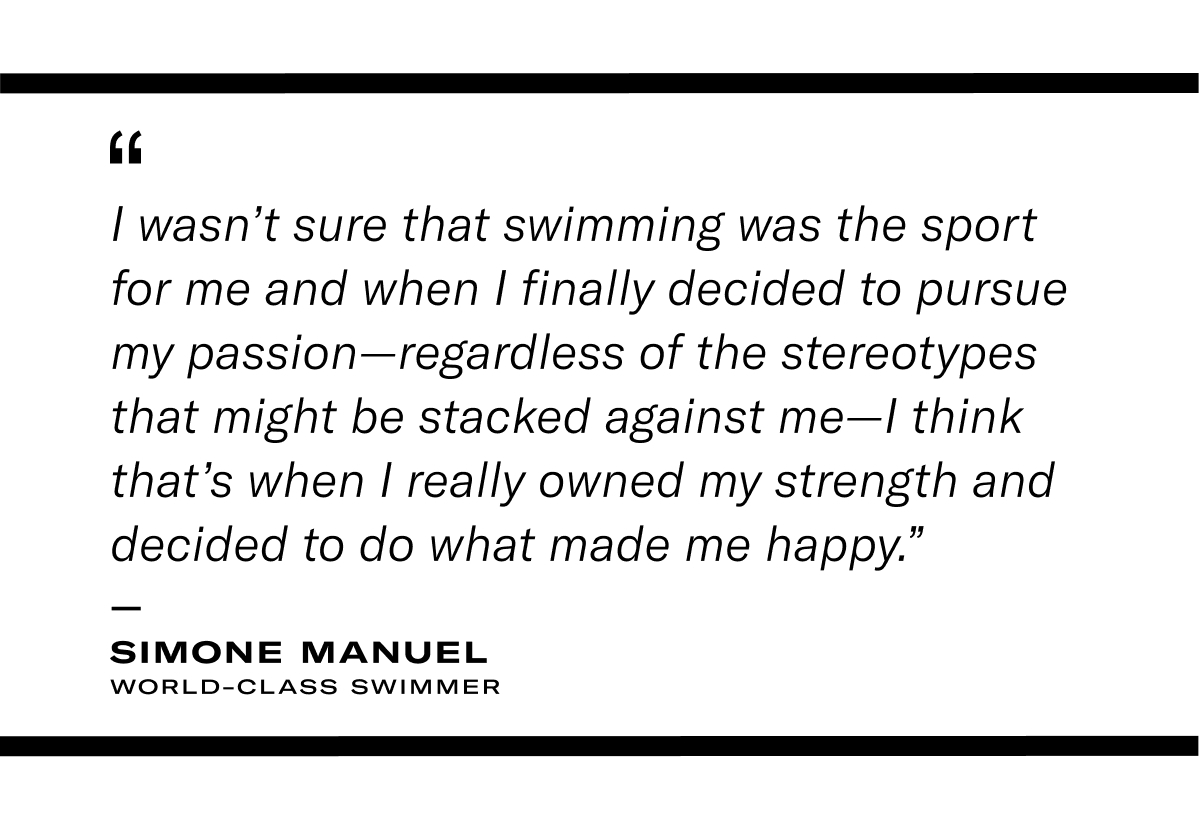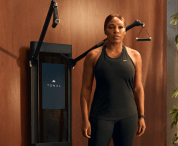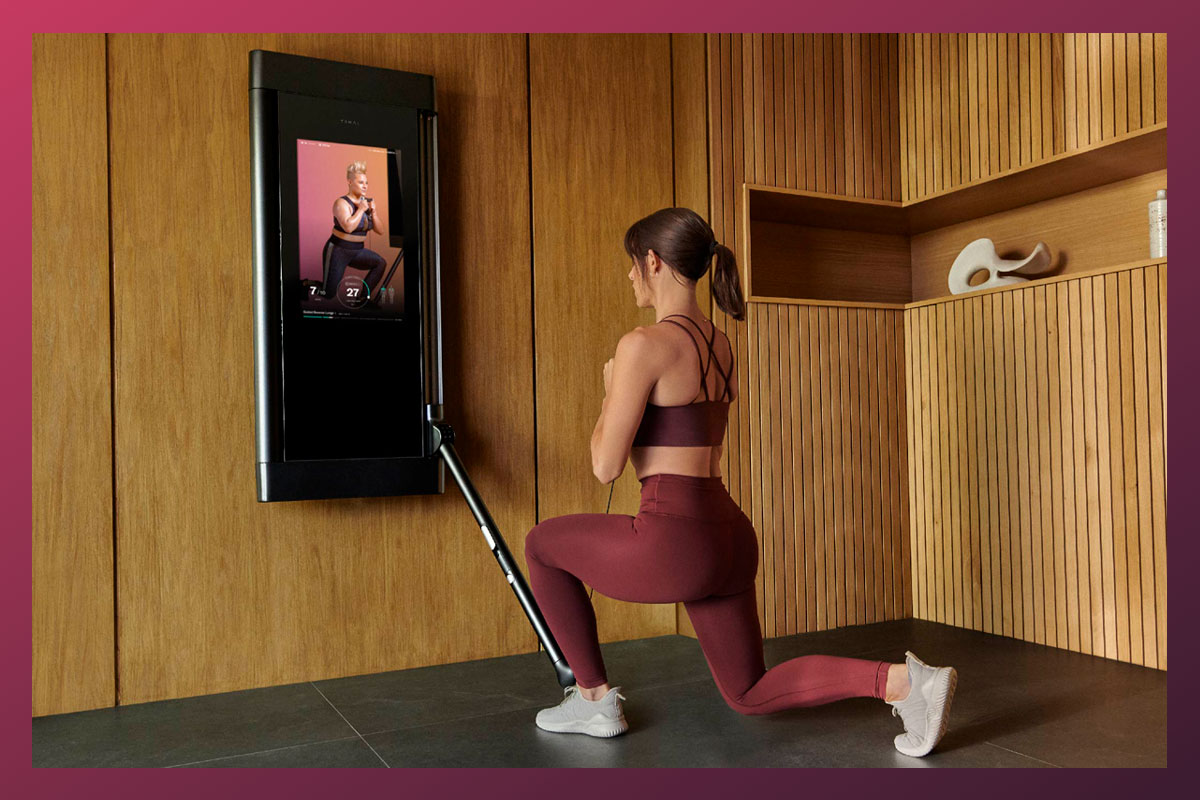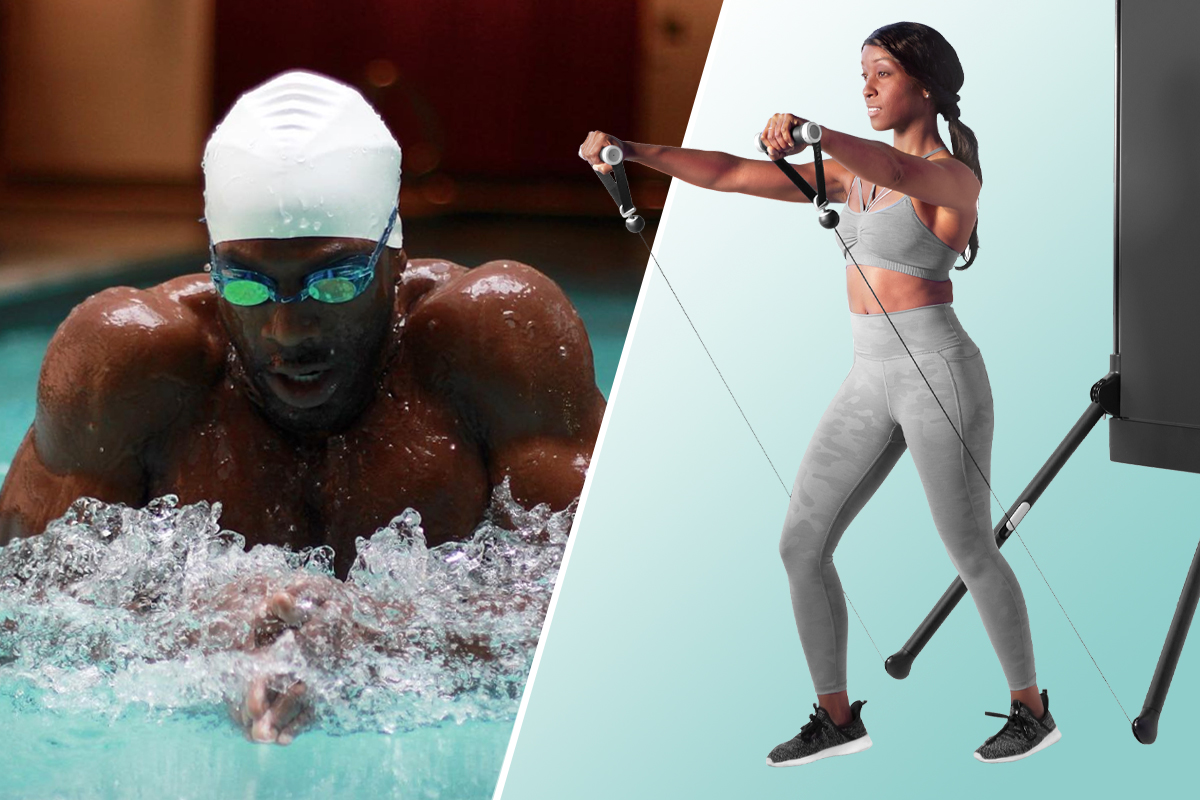Taking a break is the most important part of this gold medalist’s training right now.

Simone Manuel is one of the most accomplished swimmers in the world. The two-time gold medalist and American record holder became the first Black woman to win an individual gold in swimming when she won at the Rio Games in 2016. To hold the top spot in any sport is a feat of strength, but Manuel said it’s what she doesn’t do that makes her strong.
“I don’t feel like I have to be strong all the time,” said Manuel during a sit-down interview with Tonal as part of the Strength Made Me campaign . “That is strength—to know you need to give your body rest and know you need recovery and that it’s okay to take a step back and just be human—not be this super athlete or this superhuman.”
While Manuel admits that it’s taken time for her to reach that point of acceptance, she also says it’s refreshing. “I hope I can continue to get better at that.”
It was January of 2021 when things started to feel off-kilter for her. At first, Manuel pushed through the warning signs. She was tired but couldn’t sleep. Workouts felt harder than they should have. Just getting up the stairs leading to the pool left her—a swimmer with world-class lungs—feeling gassed.
Then in March, she was diagnosed with overtraining syndrome , an ailment that occurs when the body starts to break down from overuse, increasing the risk of injury and delaying recovery. It can lead to emotional symptoms such as insomnia, increased anxiety, and depression. While it can affect recreational athletes who train at excessively high volume, overtraining syndrome is most likely to affect elite athletes.

The best remedy to combat overtraining syndrome is complete rest. But because of the timing of the Trials, Manuel could only take a brief break. The reigning Olympic 100-meter freestyle champ took three full weeks off before competing in the Trials in June. There, she missed the final in the 100-meter freestyle, scrubbing her chance to stand atop the podium in that event again in Japan. But she later won the 50-meter freestyle to punch her ticket to the Games. In Tokyo, she earned a spot on to the women’s 4×100 freestyle relay, where she anchored the team to a bronze medal finish.
After the Games, Manuel paused her training completely to recover physically and mentally.
“I think that any time you’re trying to achieve something, there’s going to be bumps and bruises along the way,” she said. “I like to say that there is no linear path to success so unfortunately when you’re trying to achieve something, you have to go through highs and lows, and it’s just part of the process. So I try to keep things in perspective and keep a positive attitude.”
Manuel’s path to swimming started when she was just four years old. On her second day of swim lessons, she swam the full length of the pool, so the story goes . As a 14-time collegiate champion at Stanford University, she is known for her flawless form in the pool. Russell Mark, the former high-performance manager for USA Swimming once called her “a textbook model,” and said he uses Manuel as an example when he’s educating coaches and athletes on freestyle technique.

While Manuel has enjoyed plenty of success in her career, she still struggled with a lack of representation and belonging in the sport. At age 12, she considered quitting swimming altogether–weighed down by stereotypes and bias in a sport that hasn’t historically included Black athletes.
“I think my strength journey began when I decided to commit to the sport of swimming,” she said. “When I was younger, I wasn’t sure that swimming was the sport for me, and when I finally decided to pursue my passion—regardless of the stereotypes that might be stacked against me—I think that’s when I really owned my strength and decided to do what made me happy.”
Recovery and rest might be the most important elements of her routine now, but strength training and mobility are still essential. “I typically focus on all my muscles,” she said. “It’s really important to be strong from head-to-toe, so I need core stability, balance, strength, and explosiveness for my starts off the blocks. Strength training is really important for swimmers because we’re working against resistance all the time in the pool.”
Now, while away from the pool and the gym, Manuel is focusing on her well-being. That means being intentional about allowing her body to rest.
“Rest for me means taking a complete break from the pool, [and from] any obligations,” she said. “It’s just me focusing on just me and the things that make me happy.” She’s spending a lot more time with friends and family, watching movies, and getting her nails done. “Those things are a form of rest for me,” she said.
Manuel is a prime example that strength isn’t a freestyle sprint to the wall. It isn’t a straight line. Sometimes it’s about knowing when to push boundaries—and when to pull back. Other times, it’s simply about owning who you are.
“When I think about strength, I think about being true to yourself,” Manuel said. “I think you are your strongest when you’re being authentically you.”



